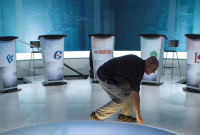Support strong Canadian climate journalism for 2025
A proposed leaders' debate on foreign policy already has one confirmed participant, with Conservative Leader Andrew Scheer quickly accepting an invitation to participate in the Munk Debates event scheduled for Oct. 1.
The Munk Debates, which organizes several events on different issues each year, announced Thursday its plans for a federal election debate involving the leaders of the Liberals, the Conservatives, the NDP and the Green Party.
On its website, the group says the event will go ahead once all four party leaders confirm their attendance, with a Sept. 24 deadline for replies. The website includes a petition aimed at pressuring the four to take part in the foreign policy-focused debate.
"In a normal election debate, foreign policy often becomes an afterthought," Rudyard Griffiths, the organizer of the Munk Debates, said in an interview.
Griffiths, who will also be the prospective event's moderator, said the current global context makes a debate centred specifically on foreign policy even more relevant now than in the last election.
"We are living through a once-in-a-generation period of global tumult," he said.
Scheer jumped at the chance to debate foreign policy — an area in which he contends Prime Minister Justin Trudeau has shown "weakness and poor judgment."
A spokesperson for the Liberal Party said Trudeau has not yet decided whether to participate, though he has committed to two official televised leaders' debates. The NDP said it would respond to the invitation once work on the Jagmeet Singh's campaign schedule is complete.
The Green Party did not immediately respond to requests to confirm whether Elizabeth May would participate in the proposed Munk debate.
Soon after the announcement, People's Party of Canada Leader Maxime Bernier critiqued the decision not to offer him an invitation.
In an emailed statement, a spokesperson for the PPC said the decision was a "blatant betrayal of the democratic process" and the invited leaders "will have nothing to debate."
The spokesperson said excluding the PPC meant the debate would not reflect the views of many Canadians who share Bernier's perspective, which is different from the "homogeneous" beliefs of the four invited leaders.
The PPC cited its opposition to the United Nations and its promise to abolish development aid as examples of its unique policy positions.
Griffiths said his organization has a responsibility to "strike a balance" between providing Canadians with a look at the views of parties they might vote for while also keeping the debate manageable and informative.
He emphasized that the invited leaders represent parties supported by roughly 90 per cent of Canadians, based on current polling. His organization had to draw a line somewhere on who could be included, carefully balancing the value to voters with the constraints of actually holding the event, he added.
"It would be ideal to have the leaders of every party on this stage, but that's no longer a debate, that's something else," Griffiths said.
"We are not the only debate happening, so we don't have to be all things to all people," he added.
Since 2008, the Munk Debates said it has provided a civil, substantive forum for leading thinkers to discuss the pressing issues of our time.
The Munk Debate's website says the debates are financially underwritten by the Canadian charitable foundation, Aurea, founded in 2006 by Peter and Melanie Munk to support institutions involved in the study and development of public policy in Canada.
The Munk Debates held a foreign policy debate during the 2015 campaign, when controversy over traditional network-organized debates meant English-language events were limited to smaller settings.
This time, a Munk debate will have to co-exist with the two official debates to be produced by a broad partnership of media organizations and organized by an independent commission.
It's possible Bernier will be allowed to participate in those events, currently scheduled for Oct. 7 and 10 in the Ottawa area. His attendance will depend on a determination by the debates commissioner, former governor general David Johnston, on whether PPC candidates have a chance at winning seats this fall.
Similar to the two official debates, the Munk debate will be broadcast for free online, and the feed will be provided at no charge to media outlets who want to carry it.
Unlike most televised debates in Canada, the proposed Munk event would take place before a live audience at Toronto's Roy Thompson Hall. Tickets would only be available to paid members of the Munk Debates, something Griffiths said is meant to avoid disruptions by partisans.





Comments